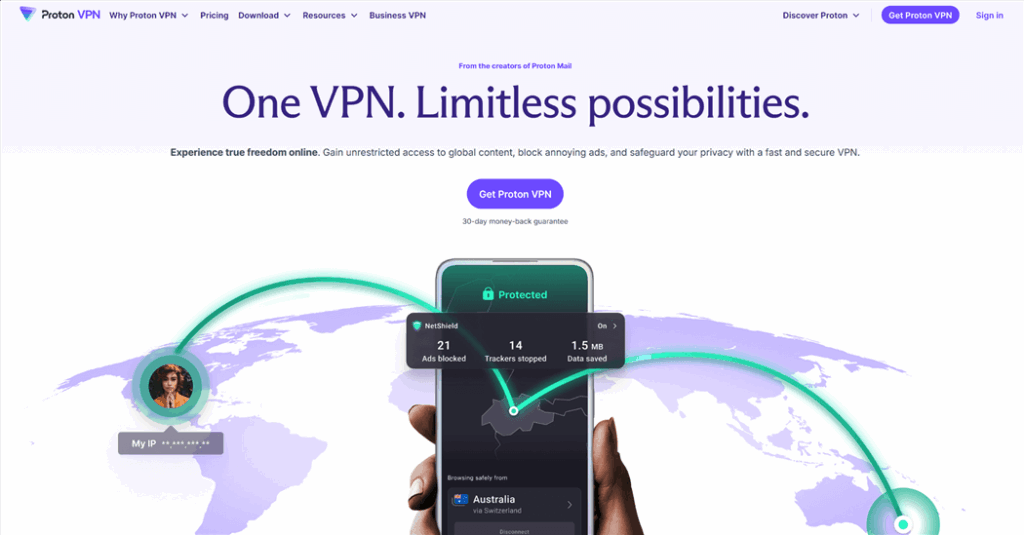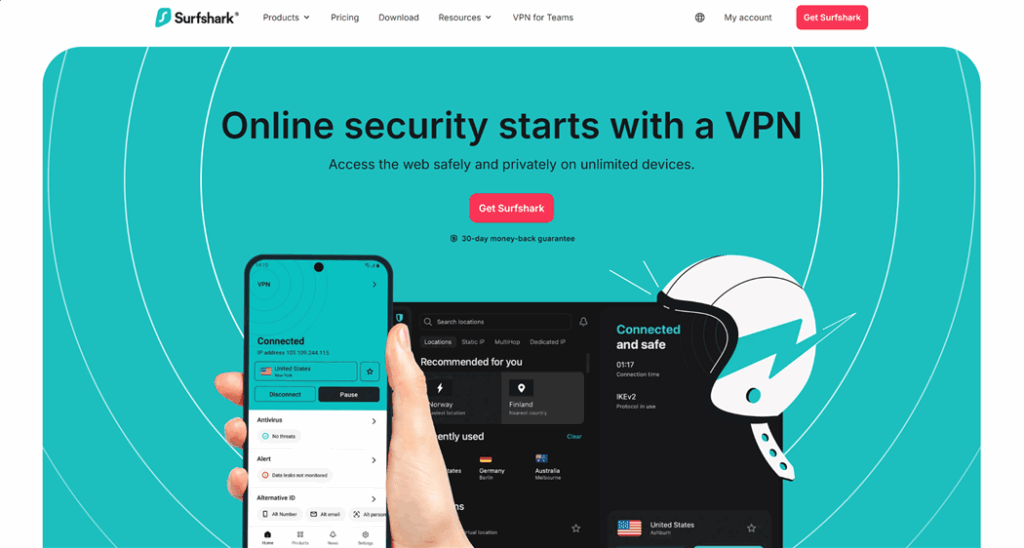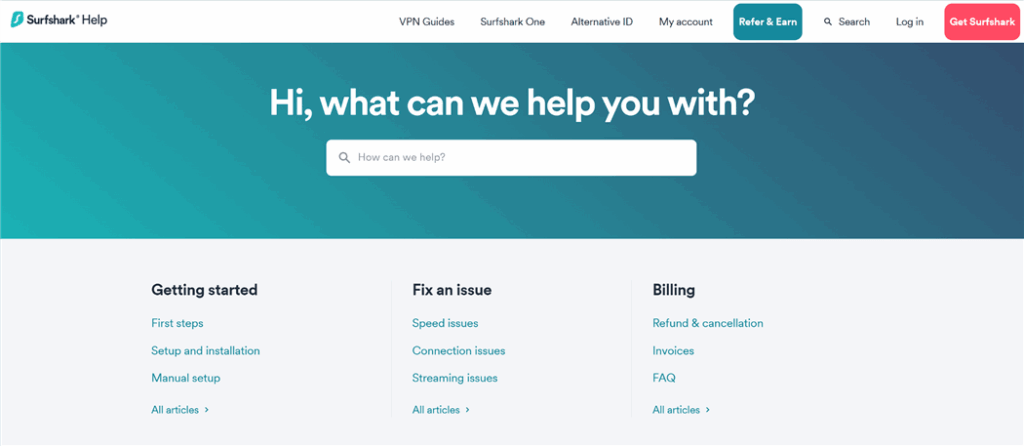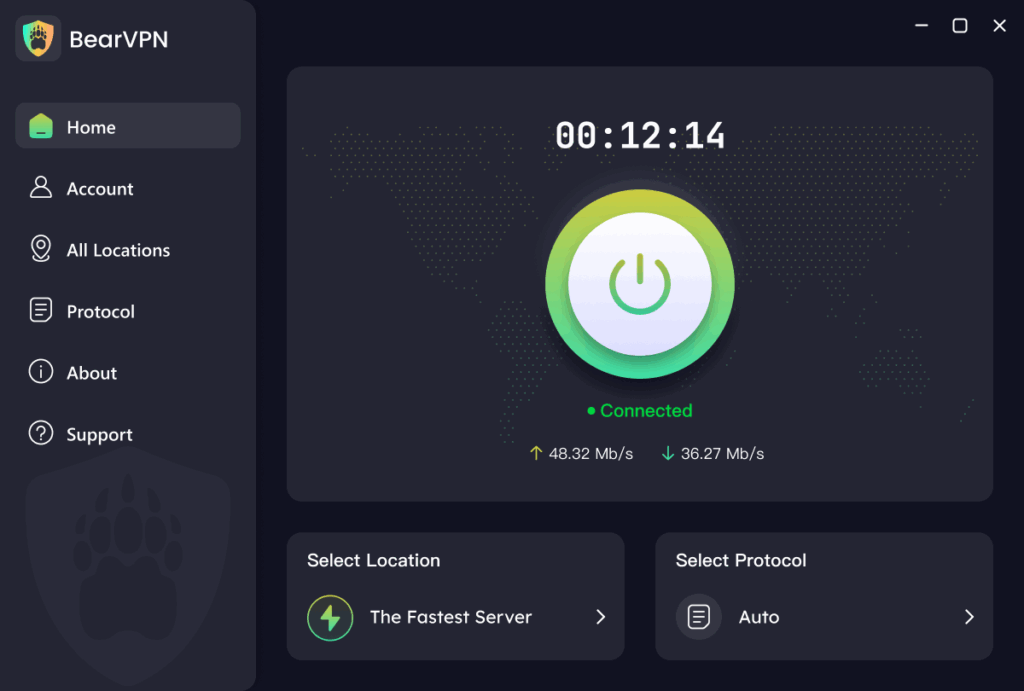If you’re comparing Surfshark and ProtonVPN, it’s easy to see why both are among the most respected VPNs available today. Each offers advanced security features, strong performance, and a proven commitment to user privacy — but they take slightly different approaches to achieving those goals. Understanding these differences can help you choose the VPN that best fits your personal or professional needs.
This detailed comparison examines Surfshark vs. ProtonVPN across key aspects, including security, speed, streaming performance, server coverage, ease of use, pricing, and customer support. You’ll see where each provider stands out, where limitations appear, and what type of user each is best suited for.
Toward the end, we’ll briefly touch on a third option, BearVPN, to highlight how emerging VPNs are evolving to strike a balance between privacy, performance, and simplicity.
Quick Comparison Table (Surfshark vs ProtonVPN Summary)
| Feature | Surfshark | ProtonVPN | Best for This Feature |
| Jurisdiction / Headquarters | Netherlands / EU (9-Eyes) | Switzerland / Proton Foundation | ProtonVPN (privacy edge) |
| Server Network | ~3,200+ servers in 100+ countries | ~15,300+ servers in 126 countries (incl. free servers) | ProtonVPN (quantity), but it depends on quality & speed |
| Speed & Performance | Strong — often retains ~90–95% of base speed | Good — sometimes more consistent on local servers | Slight edge to Surfshark for global reach |
| Streaming & Unblocking | Excellent (Netflix, Disney+, Hulu, BBC iPlayer) | Works on “Plus” servers, less consistent | Surfshark |
| Simultaneous Devices | Unlimited | Up to 10 (paid) | Surfshark |
| Free Plan | ❌ | ✅ (limited servers, no streaming/P2P on free) | ProtonVPN (for free-tier users) |
| Privacy / No-Logs / Audits | Independent audits, RAM-only servers | Open-source code, audited, non-profit structure | ProtonVPN (transparency edge) |
| Pricing (long-term) | Very competitive (e.g., ~$1.99/mo on 2-year plan) | More expensive in the long term, but the free tier offsets the cost | Surfshark (for paid users) |
| Support | 24/7 live chat & email | Ticket support, community forum | Surfshark (for ease) |
Summary Verdict: For many users, Surfshark offers better value, stronger streaming performance, and unlimited device support. But ProtonVPN remains a top pick for those who prioritize transparency, trust, and privacy-first architecture.
In the following sections, let’s dig deeper into each dimension to see which VPN shines in which area.
Security & Privacy: Transparency vs Innovation
1. Encryption, Protocols & Advanced Features
Encryption & Protocols: Both Surfshark and ProtonVPN use AES-256 encryption and support modern protocols like WireGuard, OpenVPN, and IKEv2.
Multi-hop / Hardening:
- ProtonVPN offers Secure Core, which routes traffic through privacy-friendly countries before exiting to the public internet.
- Surfshark uses Dynamic MultiHop and Camouflage/obfuscation modes (e.g., “Camouflage Mode” to mask VPN usage).
Obfuscation / Stealth: ProtonVPN’s Stealth Protocol helps disguise VPN traffic as HTTPS traffic when needed.
Server architecture:
- Surfshark uses RAM-only (diskless) servers, meaning no data is physically stored persistently on server drives.
- ProtonVPN historically used full-disk encryption to protect data, though its internal infrastructure design emphasizes strong encryption layers. (CyberInsider notes ProtonVPN relies on full disk encryption while Surfshark relies on RAM-only servers).
2. Logging Policies & Audits
ProtonVPN:

- Based in Switzerland (strong privacy laws).
- Moved operations toward a non-profit Proton Foundation as of mid-2024 to reinforce user-first governance.
- Its apps are open source, enabling community audits.
- Proton has undergone audits by Securitum and publishes transparency reports.
- In July 2025, Proton passed its first SOC 2 Type II audit, confirming operational and security controls for its business processes.
Surfshark:

- Located in the Netherlands (an EU + 9-Eyes jurisdiction).
- Uses RAM-only servers (i.e., no persistent logs).
- Has been independently audited by Deloitte (in 2023 and again in 2025) to verify its no-logs claim.
- Operates under a strict internal policy to never keep logs.
Because both providers have strong security, the decision often comes down to transparency and trust. Proton’s open-source and nonprofit model gives it a slight advantage in trust with privacy purists, while Surfshark’s audits and RAM-only design ensure strong technical assurance.
Speed and Performance: Which VPN Is Faster?
Speed is often a make-or-break metric. A VPN that slows your connection too much loses utility—even the most secure one won’t help if you can’t stream, browse, or game smoothly.
Performance Insights & Testing Results
Surfshark often retains over 90% of base connection speed, while ProtonVPN typically maintains between 80%–90%, depending on server distance. Surfshark’s Nexus architecture, which dynamically routes traffic through optimized paths, helps reduce latency and packet loss.
ProtonVPN’s VPN Accelerator improves throughput on distant servers, but results vary by location. Surfshark’s advantage lies in more balanced global performance and faster routing during high-traffic periods.
Latency, Consistency & Stability
- For ping-sensitive tasks like gaming or video conferencing, latency matters more than raw throughput. Surfshark’s broad network often gives it lower-latency choices.
- ProtonVPN can perform very well on regional servers with consistent speeds and stable connections, particularly where there’s strong local infrastructure.
- When you switch servers or your connection is further away from a VPN exit, Surfshark’s use of multiple routing paths (its “Nexus” architecture) can help maintain stability.
For most users and typical use cases, Surfshark tends to offer faster, more consistent performance globally. ProtonVPN can shine locally or in stable setups but may lag in long-distance or high-traffic tests.
Streaming & Torrenting: Unblocking Power
One frequent reason users switch VPNs is to unlock geo-restricted content or use P2P/torrenting safely.
Streaming (Netflix, Hulu, BBC iPlayer, etc.)
- Surfshark consistently unblocks major platforms like Netflix (US, UK, Japan, etc.), Disney+, Hulu, BBC iPlayer, Amazon Prime Video, and others. Many reviewers cite its reliability in circumventing regional blocks.
- ProtonVPN supports streaming only on its Plus servers. That means fewer server options for streaming compared to Surfshark, limiting flexibility.
- Some content providers detect and block “VPN exit IPs.” Surfshark’s regular server rotation and obfuscation efforts help it stay ahead more often.
Torrenting / P2P Support
- Surfshark allows torrenting on all servers, and many users rely on it for safe file sharing.
- ProtonVPN restricts P2P to specific servers (typically in selected countries) and disables it on free servers.
- Security implications: Both have a kill switch and leak protection, but Surfshark’s broader P2P support gives it an edge for users who frequently torrent.
For users primarily focused on streaming and torrenting, Surfshark is the stronger choice. ProtonVPN is more restrictive in this area, though acceptable for moderate use if you pick the right server.
Server Network and Reliability
A large network isn’t always better—but distribution, quality, and optimization matter a lot.
- ProtonVPN boasts ~15,300 servers across 126 countries (including free servers) as of mid-2025.
- Surfshark maintains ~3,200+ servers in 100 countries.
- While ProtonVPN has a higher absolute server count, many of them are allocated to free or low-tier nodes, which may suffer from congestion.
- Surfshark’s smaller network tends to focus on premium, well-optimized servers, giving better consistency.
- Surfshark’s Nexus infrastructure (its internal backbone connecting all servers) helps with traffic routing, IP rotation, and dynamic connections.
- Reliability depends on uptime, maintenance, server load — in comparative tests, Surfshark is often praised for fewer disconnects and stable performance.
ProtonVPN edges in sheer numbers, but Surfshark frequently delivers better real-world reliability due to infrastructure choices and optimization.
Ease of Use & Apps
Features are important, but if the user experience is poor, much of the value is lost.
Interface & Usability:
- Surfshark is known for its clean, beginner-friendly interface, with useful toggles (e.g., “Start VPN on device boot,” split tunneling, etc.).
- ProtonVPN offers a more advanced dashboard, which appeals to tech-savvy users who want more granular control.
Cross-Platform Support: Both support Windows, macOS, Android, iOS, Linux, and browser extensions (Chrome, Firefox, Edge).
Connection Stability: Reviewers generally report fewer dropouts with Surfshark in everyday usage.
Onboarding & Setup: Surfshark offers straightforward setup, QR codes, and tutorials. ProtonVPN’s setup is slightly more nuanced, especially when using advanced protocol features.
This user-experience difference can be a deciding factor for casual users. A user who only cares about privacy may still prefer ProtonVPN; a user who wants everything to “just work” may lean toward Surfshark.
Pricing, Plans & Value for Money
Cost is always a key consideration.
| Category | Surfshark | ProtonVPN |
| Long-term Price (Approx.) | ~$1.99/month (2-year plan, billed upfront) | ~$4.49/month (1–2-year plan) |
| Monthly Price | ~$15.45/month | Around ~$12/month (varies by plan) |
| Free Plan | ❌ None | ✅ Yes (unlimited data; limited servers, no streaming/P2P) |
| Plan Options / Bundles | Surfshark One / One+ bundles (include antivirus, ID protection, etc.) | Plus and higher-tier plans (premium features, higher cost) |
| Refund Policy | 30-day money-back guarantee | 30-day money-back guarantee |
| Value Summary | Excellent value for multi-device users and families | Higher cost but strong free tier for light or privacy-focused users |
Value Assessment
- For long-term prepaid users, Surfshark offers better per-month value (especially for families or users with many devices).
- ProtonVPN’s free plan is a unique value proposition for users who just need light VPN use without paying.
- The question: Does Proton’s extra transparency or privacy features justify its higher cost for you? For many users, it may not.
Customer Support & Reliability
Support quality can make or break a Pro-level experience.
Surfshark:

- Offers 24/7 live chat and email support.
- Extensive knowledge base, tutorials, FAQs, and setup guides.
ProtonVPN:
- Uses ticket-based support and community forums.
- Slower response times in some reports, but the user community is strong.
Because help matters when you run into issues (connection problems, refunds, setup on special devices), Surfshark’s responsive support is a plus for many users.
Real-World Use Cases: Which VPN Fits You?
Below is a decision-guidance table to help potential users pick based on their priorities:
| Use Case / Priority | Best Option | Why |
| Streaming & unblocking content (Netflix, Hulu, etc.) | Surfshark | Superior consistency across many platforms |
| Torrenting / P2P usage | Surfshark | Permissive across servers |
| Maximum privacy & transparency | ProtonVPN | Swiss jurisdiction, open source, nonprofit structure |
| Budget / value-focused | Surfshark | Lower per-month cost for full-featured plans |
| Free VPN access / light use | ProtonVPN (Free plan) | No bandwidth limit, but limited features |
| Beginners who want “set it and forget it” | Surfshark | Easier UI, better support |
| Tech-savvy users who want granular control | ProtonVPN | More advanced dashboard and features |
The “best” VPN depends heavily on your use case — so weigh your needs: content, privacy, cost, or ease of use.
BearVPN: A Smart Alternative to Surfshark and ProtonVPN
While Surfshark and ProtonVPN are two of the most established names in the VPN world, BearVPN has emerged as a modern alternative that focuses on simplicity, privacy, and intelligent performance. It’s designed for users who want strong protection without the need to adjust complex settings.
BearVPN is a next-generation VPN service built around a privacy-first philosophy. It combines automatic smart routing, secure encryption, and a minimalist interface to make privacy protection fast and effortless. The app automatically chooses the best route for your connection, ensuring stable speeds and reliable access across different networks.

Key Features of BearVPN
- Strict No-Logs Policy – BearVPN does not store or track user data, browsing history, or connection metadata.
- Multiple Connection Modes – Includes Direct Mode for maximum speed and Cloud Mode for better obfuscation in restricted regions.
- Private Browser Integration – Built-in secure browser that blocks trackers, cookies, and ads for safer browsing.
- Cross-Platform Compatibility – Available on major devices and operating systems, offering a quick one-tap connection.
- Free and Premium Options – A free ad-supported plan for casual users and premium tiers for advanced privacy and higher speeds.
FAQs on Surfshark vs ProtonVPN
Is ProtonVPN better than Surfshark for privacy?
Yes, in terms of transparency and jurisdiction, ProtonVPN has a slight edge. It’s open-source, based in Switzerland, and runs under a nonprofit model. Surfshark is also very secure with RAM-only servers and verified no-logs audits but operates from the Netherlands, part of the Nine-Eyes alliance. Both are safe, but privacy enthusiasts often prefer ProtonVPN.
Which VPN is faster?
Surfshark is usually faster overall, retaining over 90% of base internet speed in most global tests. ProtonVPN performs well on nearby servers but may slow down on distant connections.
Is ProtonVPN’s free plan worth it?
Yes — it’s one of the best free VPNs available, offering unlimited data and strong security. However, it has limits: fewer servers, no streaming or P2P, and slower speeds at peak times. It’s great for light use, but frequent users will benefit more from a paid plan.
Do Surfshark and ProtonVPN work in China?
Neither VPN guarantees consistent access in China. Both have obfuscation/stealth modes, but many users report mixed results. In severe censorship environments, VPNs like ExpressVPN or specialized anti-censorship tools often outperform them. Use obfuscation settings and test periodically.
Conclusion
Choosing between Surfshark and ProtonVPN ultimately comes down to what you value more: performance, streaming, and unlimited access (Surfshark) or transparency, trust, and privacy-first architecture (ProtonVPN). Both are excellent — but each has its niche strengths.
If you’re undecided or want a third option, BearVPN deserves a test. With its promise of privacy, innovative modes, and simple experience, it may surprise you with how well it balances the strengths of both.
Next step: Try your preferred VPN (or BearVPN) under real-world conditions: test speeds, streaming with your desired services, and see which service best fits your priorities.
Wish you success — and if you want help writing shorter variant versions (for mobile, or for specific subtopics like “speed test”) or optimizing internal links to other BearVPN content, I can help with that too. Let me know!


![Roblox Banned Countries 2025: Is It Blocked In Your Region? [Updated List]](/_next/image/?url=https%3A%2F%2Fcms.bearvpn.com%2Fwp-content%2Fuploads%2F2025%2F08%2Fwhere-is-roblox-banned-featured-image.png&w=640&q=75)
